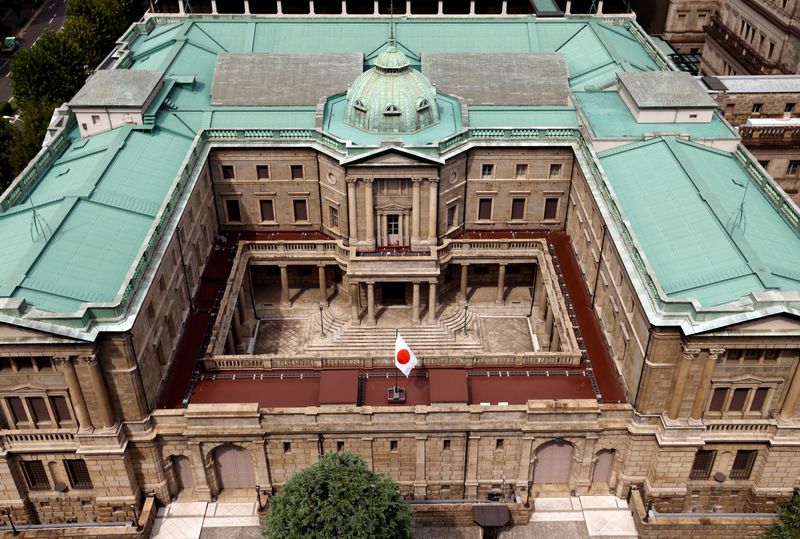By Satoshi Sugiyama
TOKYO (Reuters) - The Bank of Japan (BOJ) will begin to unwind its ultra-loose monetary settings as early as January, more than a fifth of economists in a Reuters poll said, heightening expectations the controversial policy era is near an end.
At the same time, over 80% of economists are expecting the Japanese central bank to ditch negative interest rates by the end of next year, a key pillar of the accommodative monetary regime, the Dec. 8-14 poll showed.
A global outlier, the BOJ is likely to end the year as one of the world's most dovish though economists are predicting it would start hiking interest rates soon. Central banks in other developed countries, on the other hand, have paused rate hikes and are even preparing to deliver cuts next year.
While none of the economists in the poll predicted changes at next week's meeting, six of 28 economists, or 21%, said the BOJ would start dismantling current monetary conditions in January.
Specifically, four of 28 - Daiwa Securities, Mitsubishi UFJ (NYSE:MUFG) Morgan Stanley, Nomura Securities and T&D Asset Management - or 14%, said the BOJ would end its negative interest rate policy at the January 22-23 meeting. Japan's short-term deposit rate is currently set at minus 0.1%.
Mitsubishi UFJ Morgan Stanley, JP Morgan and ZKB predicted the BOJ would abandon its yield curve control (YCC) policy in January. Daiwa Securities foresaw the BOJ tweaking YCC again, raising the long-term interest rate guidance target and retaining the policy's framework to avoid a sharp rise in long-term interest rates.
It would be desirable for Ueda to issue a directive this month to BOJ leadership to begin considering lifting the negative interest rate so the market is informed in advance, said Mari Iwashita, Daiwa Securities' chief market economist.
"Even with the lifting of the negative rate policy, the BOJ will explain that the financial environment is still accommodative," Iwashita said.
In last month's poll, five of 26, or 19%, forecast the start of monetary tightening in January.
BOJ Governor Kazuo Ueda's said last week the central bank was facing an "even more challenging" situation at year-end and at the start of 2024, jolting markets as speculators ramped up bets that a policy shift was imminent.
END IN SIGHT
In total, 84% of economists predicted the negative rate policy to be over by end-2024 in their end-quarter forecast, up from 71% in November and 54% in October.
April remained as a top choice among economists for the negative rate policy to be scrapped, with 61%, or 17 of 28, responding as such to an extra question. Four opted for July, while three selected 2025 or later.
In April, the BOJ will revise the price outlook and state in its quarterly report the price target would be achieved after determining the rate of wage increases in next year's spring labour negotiations, said Moe Nakahama, research associate at Itochu Research Institute.
The Japanese central bank would end both the negative rate and YCC policies at the same time in April, she said.
During the January-March quarter next year, 10 of 44 economists predicted the deposit rate to be between 0.00% and 0.10%.
In the following quarter, 28 of 42 respondents expected the rate to be either 0.00 or 0.10%, while another two - Allied Irish Banks and Fukoku Mutual Life Insurance - anticipated it to go as high as 0.25%.
Meanwhile, nearly 90% of economists, or 23 of 26, said the BOJ would end the YCC rather than tweak it again.
Of those 23, all except Citigroup and Mizuho Securities picked sometime in 2024. Three opted for January, one went for March, 10 selected April, one identified June and another five chose July.
(For other stories from the Reuters global economic poll:)
